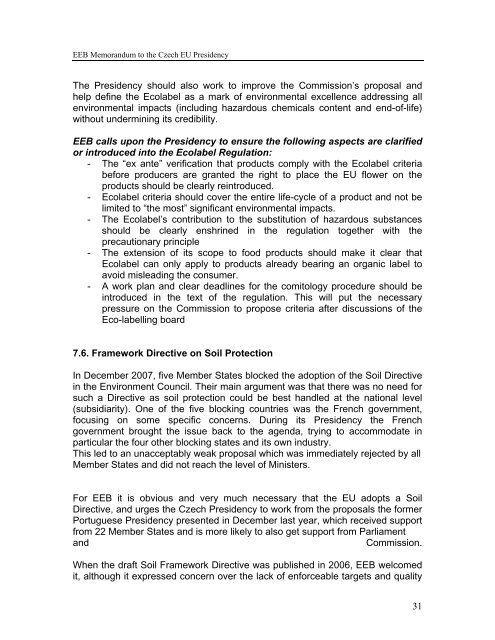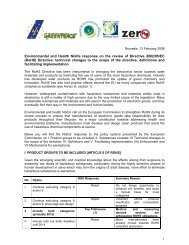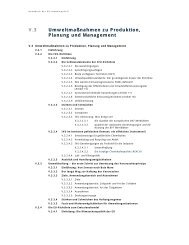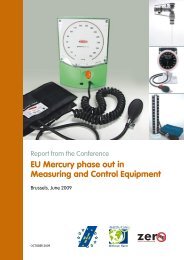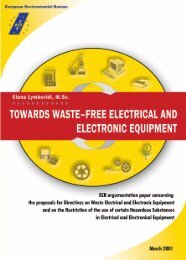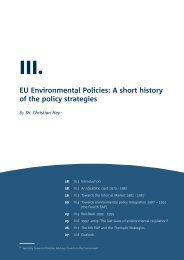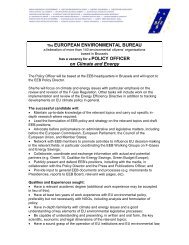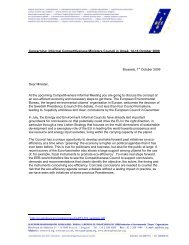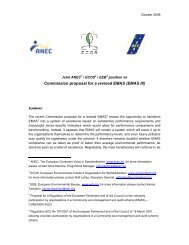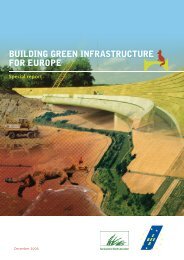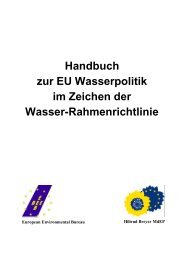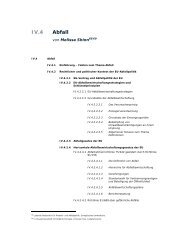Memorandum to Czech Presidency and Ten Test - EEB
Memorandum to Czech Presidency and Ten Test - EEB
Memorandum to Czech Presidency and Ten Test - EEB
- No tags were found...
You also want an ePaper? Increase the reach of your titles
YUMPU automatically turns print PDFs into web optimized ePapers that Google loves.
<strong>EEB</strong> <strong>Memor<strong>and</strong>um</strong> <strong>to</strong> the <strong>Czech</strong> EU <strong>Presidency</strong>The <strong>Presidency</strong> should also work <strong>to</strong> improve the Commission’s proposal <strong>and</strong>help define the Ecolabel as a mark of environmental excellence addressing allenvironmental impacts (including hazardous chemicals content <strong>and</strong> end-of-life)without undermining its credibility.<strong>EEB</strong> calls upon the <strong>Presidency</strong> <strong>to</strong> ensure the following aspects are clarifiedor introduced in<strong>to</strong> the Ecolabel Regulation:- The “ex ante” verification that products comply with the Ecolabel criteriabefore producers are granted the right <strong>to</strong> place the EU flower on theproducts should be clearly reintroduced.- Ecolabel criteria should cover the entire life-cycle of a product <strong>and</strong> not belimited <strong>to</strong> “the most” significant environmental impacts.- The Ecolabel’s contribution <strong>to</strong> the substitution of hazardous substancesshould be clearly enshrined in the regulation <strong>to</strong>gether with theprecautionary principle- The extension of its scope <strong>to</strong> food products should make it clear thatEcolabel can only apply <strong>to</strong> products already bearing an organic label <strong>to</strong>avoid misleading the consumer.- A work plan <strong>and</strong> clear deadlines for the comi<strong>to</strong>logy procedure should beintroduced in the text of the regulation. This will put the necessarypressure on the Commission <strong>to</strong> propose criteria after discussions of theEco-labelling board7.6. Framework Directive on Soil ProtectionIn December 2007, five Member States blocked the adoption of the Soil Directivein the Environment Council. Their main argument was that there was no need forsuch a Directive as soil protection could be best h<strong>and</strong>led at the national level(subsidiarity). One of the five blocking countries was the French government,focusing on some specific concerns. During its <strong>Presidency</strong> the Frenchgovernment brought the issue back <strong>to</strong> the agenda, trying <strong>to</strong> accommodate inparticular the four other blocking states <strong>and</strong> its own industry.This led <strong>to</strong> an unacceptably weak proposal which was immediately rejected by allMember States <strong>and</strong> did not reach the level of Ministers.For <strong>EEB</strong> it is obvious <strong>and</strong> very much necessary that the EU adopts a SoilDirective, <strong>and</strong> urges the <strong>Czech</strong> <strong>Presidency</strong> <strong>to</strong> work from the proposals the formerPortuguese <strong>Presidency</strong> presented in December last year, which received supportfrom 22 Member States <strong>and</strong> is more likely <strong>to</strong> also get support from Parliament<strong>and</strong>Commission.When the draft Soil Framework Directive was published in 2006, <strong>EEB</strong> welcomedit, although it expressed concern over the lack of enforceable targets <strong>and</strong> quality31


